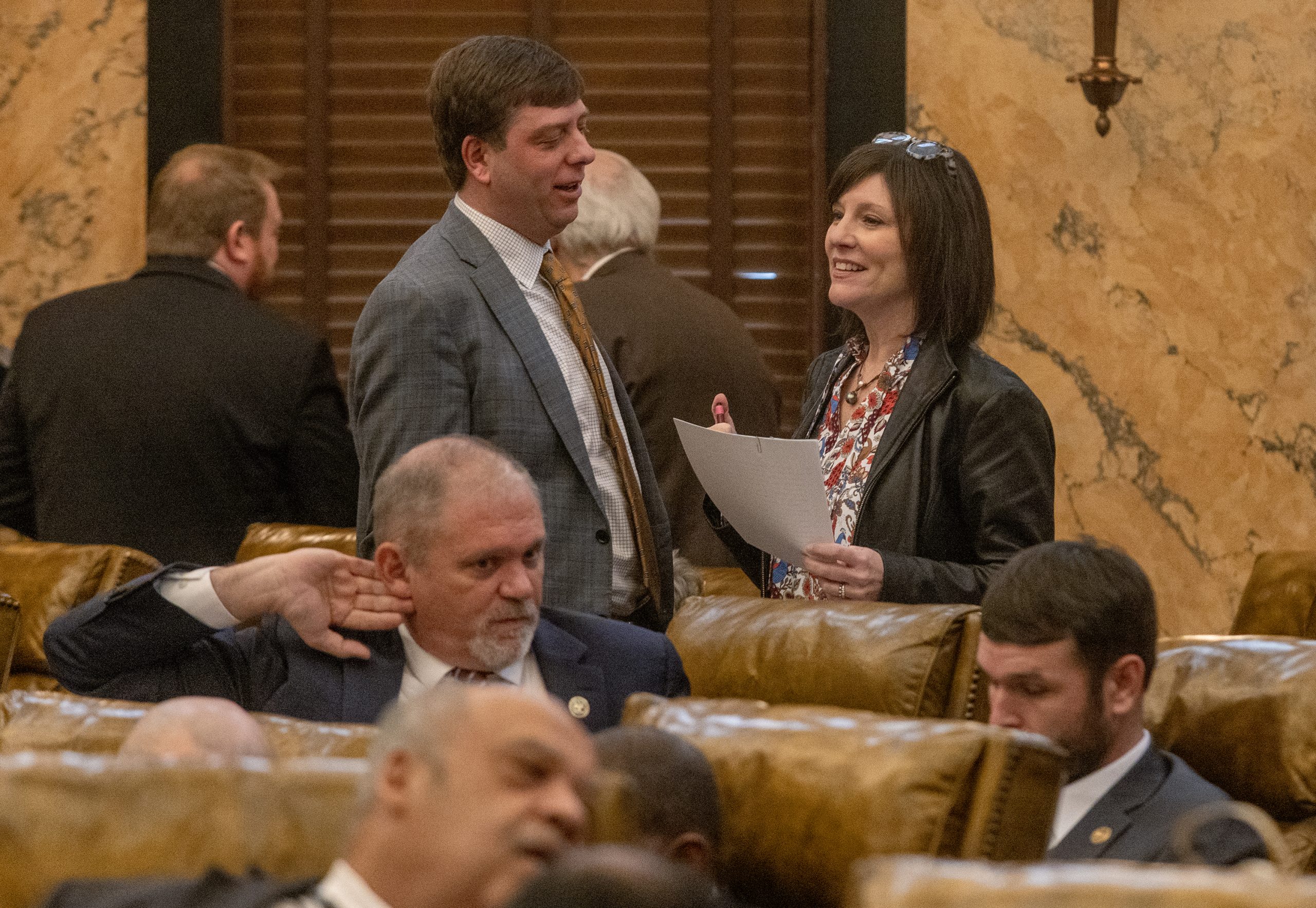Mississippi Today
New legislative leadership: Nothing off table in tackling Mississippi health issues

Last year, committee chairs in the House and Senate killed every Medicaid expansion bill without a debate or vote.
Now, for the first time in a decade, a policy that has been politically forbidden in Mississippi will at least get a full hearing.
That's because of pivotal changes in House leadership. Newly elected Speaker Jason White appointed Missy McGee, R-Hattiesburg, to chair the Medicaid Committee, and Sam Creekmore IV, R-New Albany, to chair the Public Health and Human Services Committee.
McGee has been a vocal proponent of postpartum coverage, which passed last year, and presumptive eligibility for pregnant women – which did not. Creekmore, along with Rep. Kevin Felsher, R-Biloxi, successfully passed legislation last year to improve mental health services in the state.
Both say that this year, nothing is off the table. And while leadership on the Senate side of Public Health and Medicaid remains the same, committee chairs there have voiced support of increasing health care coverage and reform.
“I do think it could definitely be a historic year for the state of Mississippi,” McGee said, “in that we have talked a lot about providing health care to low-income workers.”
McGee and Creekmore have also been diligent about reframing the narrative around expansion to make it clear that the increased coverage they support is not welfare and it's not a handout – it's health care coverage for low-income, working-class Mississippians.
“And we don't really know what that's going to look like right now,” McGee said, “but it has been something that the majority of Mississippians really support. I'm looking forward to coming up with sound policy that would provide this option for hardworking Mississippians who can't afford health care – whether their employers don't offer it, or whether they simply can't afford to purchase it.”
McGee said she is also looking forward to reintroducing her presumptive eligibility bill – which would allow pregnant women to be presumed eligible for Medicaid and receive timely prenatal care. House Bill 539 was assigned to committee this week.
“We know that with a lot of women who are eligible for Medicaid, it often takes quite a while before they are able to get on their Medicaid benefits – and sometimes it can be beyond the first trimester,” she said.
McGee says she has confidence presumptive eligibility will pass this year, and will help move Mississippi off the top of the list for infant and maternal mortality – which she says is her goal for the term.
“I just feel like it's got a lot more momentum this year than it has in years past,” she said.
Creekmore said he was surprised at his appointment to chair the Public Health Committee, and he did not ask for it – though it was his first choice.
Creekmore, who comes from a family of health care workers, said health care has always been “near and dear” to him. He remembers, growing up, the phone would sometimes ring in the middle of the night and he would wake up his father to attend a delivery.
“He's a hometown doctor and he's my hero,” Creekmore said about his father.
Last year, Creekmore authored House Bill 1222 – which provides mental health training for law enforcement and helps families dealing with the court systems. It passed unanimously.
“My first four years, for whatever reason, the Lord has led leadership to put me into the mental health realm, and we've made some great strides,” Creekmore said. “I want to continue to do that, and I just thought I would be more effective in Public Health.”
In the Senate, Kevin Blackwell, R-Southaven, is introducing a presumptive eligibility bill similar to McGee's.
In addition to two presumptive eligibility bills coming from both the House and Senate, Blackwell said, “we'll also probably have it added to the tech bill. It's a serious issue for a lot of us on this side.”
The Medicaid technical bill is a notoriously complicated bill with a lot of jargon that outlines the function and scope of Medicaid, and which must be renewed every three years. This year, it's up for renewal.
The tech bill could be a way to pass presumptive eligibility for pregnant women or Medicaid expansion – if separate bills on those fronts aren't successfully passed. The tech bill usually bounces back and forth between the chambers, and involves concessions on both sides, since, unlike other bills, the tech bill must be renewed for the program to operate.
Aside from presumptive eligibility, Blackwell also filed Senate Bill 2080, on professional midwifery, and Senate Bill 2079 on nurse-practitioner collaboration agreements.
The midwifery bill would look at establishing a formal licensed midwifery program in the state – the first of its kind.
Midwifery is currently not regulated in Mississippi, meaning anyone can practice without formal training or certification. Midwives who want to undergo a certification program end up going out of state – and sometimes don't return.
In a state riddled with maternity care deserts, losing providers to neighboring states because they are offering a service Mississippi could easily offer just doesn't make sense, Blackwell explained.
Midwifery, he says, is an obvious solution for non-complicated, low-risk births, since “women have been helping women have babies since our primitive days.”
Senate Bill 2079 seeks to abolish restrictive collaboration agreements between nurse practitioners and physicians.
These agreements are expensive and limit the freedom with which nurse practitioners can operate. They usually have distance limitations, as well, placing restrictions on how far from their collaborating physicians nurse practitioners can practice. Since most physicians operate in urban areas, that means nurse practitioners can't provide care to the rural communities that desperately need it.
“All it is is a paid relationship and it needs to go away,” Blackwell said. “Nurse practitioners aren't killing folks, they're not doing major surgeries, open heart surgeries. They're practicing within the confines of their license and given our need to have access to health care, why would we not do this?”
Blackwell has filed similar bills in past years, but they all died in committee.
Like Blackwell in Medicaid, Hob Bryan, D-Amory – the longest-serving state senator – is continuing to chair Public Health.
Bryan said he is excited to be “on the horizon of a new four-year term,” although, he joked, he might not make it that long – a nod to the presentation State Health Officer Dr. Daniel Edney gave to the Senate Public Health Committee last Wednesday.
In it, Edney had stressed the urgency of several public health metrics and had said to Bryan “I don't think I'm the oldest one in this room, no offense Mr. Chairman, the life expectancy is 71,” – the lowest in the country.
“These are real numbers that impact real Mississippians,” Edney said. “We have the highest rate of preventable deaths. That means more Mississippians die unnecessarily every year than anywhere else in this country, and these problems have solutions. I trust your good judgment to get us where we need to be. And I want to help you with whatever data, information, resource you need.”
While it's unclear whether Republicans who say they will consider Medicaid expansion will ultimately support it, Bryan has been more outspoken with his beliefs that the current system of coverage is not working for low-income working Mississippians.
Diabetes, according to Bryan, is a “maddening example” of a group of people who are ineligible for preventative care, and become eligible for health care only by the time they need to have limbs amputated.
“At which point, congratulations!” Bryan exclaimed. “Now you are disabled and you qualify for health care.”
Edney gave presentations to both the House and Senate Public Health committees during their first meetings of the session. Rep. McGee says her committee will be hearing from Drew Snyder, Mississippi Medicaid executive director, next week.
The deadline to file bills is Feb. 19, later than most years since the first session of a new term is 120 days, as opposed to the typical 90 days.
This article first appeared on Mississippi Today and is republished here under a Creative Commons license.
Mississippi Today
On this day in 1896


MAY 18, 1896

The U.S. Supreme Court ruled 7-1 in Plessy v. Ferguson that racial segregation on railroads or similar public places was constitutional, forging the “separate but equal” doctrine that remained in place until 1954.
In his dissent that would foreshadow the ruling six decades later in Brown v. Board of Education, Justice John Marshall Harlan wrote that “separate but equal” rail cars were aimed at discriminating against Black Americans.
“In the view of the Constitution, in the eye of the law, there is in this country no superior, dominant, ruling class of citizens,” he wrote. “Our Constitution in color-blind and neither knows nor tolerates classes among citizens. In respect of civil rights, all citizens are equal before the law. The humblest is the peer of the most powerful. The law … takes no account of his surroundings or of his color when his civil rights as guaranteed by the supreme law of the land are involved.”
This article first appeared on Mississippi Today and is republished here under a Creative Commons license.
Did you miss our previous article…
https://www.biloxinewsevents.com/?p=359301
Mississippi Today
Renada Stovall, chemist and entrepreneur
Renada Stovall sat on the back deck of her rural Arkansas home one evening, contemplating life when she had a life-altering epiphany…
“I gotta get out of these woods.”
She heard it as clear as lips to her ear and as deep as the trees surrounding her property. Stovall's job as a chemist had taken her all over the country. In addition to Arkansas, there were stints in Atlanta, Dallas and Reno. But she was missing home, her parents and friends. She also knew, she needed something else to do.
“I thought, what kind of business can I start for myself,” said Stovall, as she watered herbs growing in a garden behind her south Jackson home. Some of those herbs are used in her all-natural products. “I know when I lived in Reno, Nevada, where it's very hot and very dry, there really weren't products available that worked for me, my hair, and my skin suffered. I've got a chemistry degree from Spelman College. I took the plunge and decided to create products for myself.”

In 2018, Stovall's venture led to the creation of shea butter moisturizers and natural soaps. But she didn't stop there, and in December 2022, she moved home to Mississippi and got to work, expanding her product line to include body balms and butters, and shampoos infused with avocado and palm, mango butter, coconut and olive oils.
Nadabutter, which incorporates Renada's name, came to fruition.

Stovall sells her balms and moisturizers at what she calls, “pop-up markets,” across the state during the summer. She's available via social media and also creates products depending on what of her ingredients a customer chooses. “My turmeric and honey is really popular,” Stovall added.
“The all-natural ingredients I use are great for conditioning the skin and hair. All of my products make you feel soft and luscious. The shea butter I use comes from West Africa. It's my way of networking and supporting other women. And it's my wish that other women can be inspired to be self-sufficient in starting their own businesses.”





This article first appeared on Mississippi Today and is republished here under a Creative Commons license.
Mississippi Today
On this day in 1954
MAY 17, 1954

In Brown v. Board of Education and Bolling v. Sharpe, the U.S. Supreme Court unanimously ruled that the “separate but equal” doctrine in Plessy v. Ferguson was unconstitutional under the 14th Amendment, which guaranteed equal treatment under the law.
The historic decision brought an end to federal tolerance of racial segregation, ruling in the case of student Linda Brown, who was denied admission to her local elementary school in Topeka, Kansas, because of the color of her skin.
In Mississippi, segregationist leaders called the day “Black Monday” and took up the charge of the just-created white Citizens' Council to preserve racial segregation at all costs.
This article first appeared on Mississippi Today and is republished here under a Creative Commons license.
-
SuperTalk FM5 days ago
Martin Lawrence making 3 stops in Mississippi on comedy tour
-
Our Mississippi Home4 days ago
Beat the Heat with Mississippi’s Best Waterparks
-
SuperTalk FM1 day ago
State auditor cracking down on Mississippians receiving unemployment benefits
-
Our Mississippi Home5 days ago
Charlie’s U-Pik: Opening Soon for the Summer Season
-
Mississippi News Video3 days ago
Jackson has a gang problem
-
Kaiser Health News4 days ago
Medicaid ‘Unwinding’ Decried as Biased Against Disabled People
-
228Sports4 days ago
George County Pours Runs In 6A South State Title Victory At PRC
-
Mississippi Today2 days ago
On this day in 1950









































